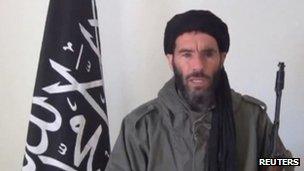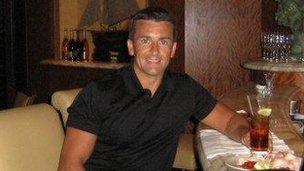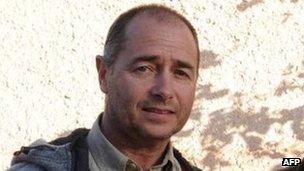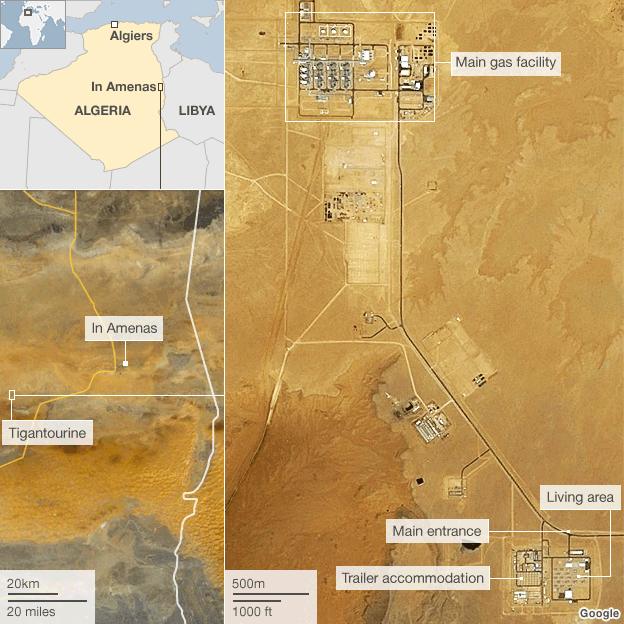Cameron: North Africa terrorist threat 'could last decades'
- Published
David Cameron: "I know the whole country will want to join me in sending our sympathies and condolences to the families who have undergone an absolutely dreadful ordeal"
David Cameron has warned the Algerian hostage crisis could be the start of a decades-long battle against Islamist terrorism in north Africa.
Three Britons are confirmed dead and three more are believed to have died after the Algerian army stormed the site at In Amenas on Saturday. Another UK resident is also thought to be dead.
One victim has been named as 46-year-old Paul Thomas Morgan.
Five hostage-takers were reported captured at the plant on Sunday.
The UK prime minister said the incident was a "stark reminder" of the terrorist threat in that part of the world and added: "This is a global threat and it will require a global response.
"It will require a response that is about years, even decades, rather than months."
'Iron resolve'
"It requires a response that is patient and painstaking, that is tough but also intelligent, but above all has an absolutely iron resolve and that is what we will deliver over these coming years," added Mr Cameron.
The prime minister, who will make a statement about the events in Algeria in the Commons on Monday, said there were clear similarities with the terrorist threat from Afghanistan and Pakistan, although it was on a different scale.

Mokhtar Belmokhtar claimed the attack was a response to France's intervention in neighbouring Mali
"What we face is an extremist, Islamist, al-Qaeda-linked terrorist group. Just as we had to deal with that in Pakistan and in Afghanistan so the world needs to come together to deal with this threat in north Africa," he said.
"It is linked to al-Qaeda, it wants to destroy our way of life, it believes in killing as many people as it can. We need to work with others to defeat the terrorists and to close down the ungoverned spaces where they thrive with all the means that we have."
A raid by Algerian troops on Saturday ended a four-day siege in which at least 48 hostages are thought to have died.
There are reports that 25 bodies found at the complex on Sunday are all those of captives.
This comes a day after Algerian officials reported the deaths of 23 hostages, with more said to be unaccounted for, and 32 militants.
Algerian officials said the hostage-takers - from six different nationalities - belonged to a new Islamist group formed by a veteran Algerian militant and kidnapper, Mokhtar Belmokhtar, who recently broke from al-Qaeda.
Mauritanian website Sahara Media says he has claimed responsibility for the hostage-taking in a video message.
He said the operation had been led by 40 migrants from "several Islamic countries, even from the Western countries".
The video is said to have showed Belmokhtar claiming he was prepared to negotiate with Western and Algerian leaders if French military offensives against Islamists in neighbouring Mali were stopped.
A BP spokesman would not comment on reports in the Algerian media that Belmokhtar had infiltrated his men as drivers, cooks and guards working on short-term contracts for BP at the complex.
The company released a statement confirming that 18 of its employees were at In Amenas at the time of the attack and 14 of them were safe, although two had sustained injuries which were not life-threatening.
"BP remains gravely concerned about four of its employees who are missing. There is no further confirmed information regarding their status at this time," the firm added.
'Free to go'
In a statement from Mr Morgan's mother, Marianne, 65, and his 36-year-old partner, Emma Steele, he was described as "a true gentleman, a family man".

The first British victim to be named was Paul Thomas Morgan, aged 46
"He very much loved his partner Emma, his mum, brothers and sister, of who he was very proud," the statement said. "He loved life and lived it to the full. He was a professional man proud to do the job he did and died doing the job he loved.
"We are so proud of him and so proud of what he achieved in his life. We are devastated by Paul's death and he will be truly missed."
Twenty-two British survivors have been flown back to the UK and reunited with their families.
Scotland's First Minister Alex Salmond said eight Scottish survivors were now back in the UK, but added: "We know that two Scots, or people with immediate Scottish family connections, are believed to have been killed."
One hostage - Alan Wright, 37, from Aberdeenshire - described hiding in an office when the Islamists attacked, before cutting through a fence and escaping.
The crisis began on Wednesday when militants attacked two buses carrying foreign workers and Algerians to the remote site in south-eastern Algeria. A Briton and an Algerian reportedly died at the scene.
The militants then took Algerians and foreign workers hostage at the complex, which was quickly surrounded by the Algerian army.
The Algerian armed forces staged an initial attack on Thursday as militants tried to move some of their captives from the facility.
Mr Cameron paid his condolences to the bereaved families, who had undergone "an absolutely dreadful ordeal".
He said questions would be asked about the Algerian response to the crisis, but added: "The responsibility for these deaths lies squarely with the terrorists who launched these vicious and cowardly attacks."

Allen McCloud, from Plymouth, was one of 22 Britons who survived the crisis
State news agency APS said 685 Algerian workers and 107 out of 132 foreigners working at the plant had been freed.
The nationalities of some of the hostages killed are still not known, but as well as the Britons, US, Norwegian, and Japanese nationals are also missing.
A Colombian citizen resident in the UK is believed to be among the dead.
'Stressful'
Two of the survivors have been named as Lou Fear, 56, from Louth in Lincolnshire and Allen McCloud, 53, from Plymouth in Devon.
Other freed hostages have been named as Iain Strachan, 38, from Howwood in Renfrewshire; Darren Matthews, from Saltburn-by-the-Sea, Teesside; Mark Grant, 29, from Grangemouth, near Falkirk; Alan Wright, 37, from Portsoy in Aberdeenshire; Peter Hunter, 53, from County Durham; David Murray, 47, from Kirkby in Merseyside; Huw Edwards, 55, from Macclesfield in Cheshire; and Stephen McFaul, 36, from Belfast.
The In Amenas gas field is situated at Tigantourine, about 40km (25 miles) south-west of the town of In Amenas and 1,300km (800 miles) south-east of Algiers.
The plant is jointly run by BP, Norway's Statoil and Algeria's state-owned oil company.
Algeria's oil minister Youcef Youcefi said the plant would return to production within the next two days.
